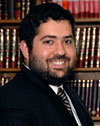Drasha for Hatzalah Chicago – by Rabbi Leonard A. Matanky, Ph.D.
by Hatzalah Chicago on Monday, May 9, 2011 at 8:37pm
On April 3, 2011, Hatzalah Chicago had a beautiful dinner to congratulate its first EMT-B graduating class and to honor the wives of Hatzalah graduates for their unyielding support.
Rabbi Matanky graced us with his presence and delivered a most moving drasha for Hatzalah Chicago:
I was thinking of beginning my brief remarks this evening with a story from Hatzola – one of the amazing but absolutely true accounts that have appeared in the press or on the internet – those selfless acts of compassion, daring deeds of rescue and split-second decisions that have saved countless lives.
I really was thinking of beginning that way… but then I realized that knowing so many of you – the best Hatazola stories are yet to be told – because Hatzalah of Chicago is yet to begin saving lives and creating those stories.
And so this evening – instead – I’ve decided to share with you a story that is more than 150 years old – a story of the terrible cholera epidemic which claimed the lives of hundreds of Jews in Vilna and the response of one of our greatest Torah luminaries – someone that Reb Chaim described as having the stature of a ראשון – the great Reb Yisrael Lipkin, or as we know him – Reb Yisrael Salanter, זצ”ל
The year was 1848, and not unlike our modern day organizers of Hatzalah, when Reb Yisrael saw the medical emergency of his time, he jumped into action, renting a hospital with hundreds of beds, enlisting the aid of volunteer doctors and organizing dozens of “yeshiva yungerleit” to serve the needs of those afflicted with that terrible disease.
Under his direction, people worked day and night – the doctors administering medical care, and the “yungerleit” supporting all of the other needs of the patients – whether chopping wood for fuel, lighting fires, or anything else, regardless if it was a weekday or Shabbos.
One Friday night, among those stricken was the grandson of one of the “g’virim” of Vilna, Reb Yosef Chalfan. And… as these “yungerleit” had done for so many others – they cared for him, doing melacha on Shabbos – until he was out of mortal danger.
Soon afterwards, the grandfather appeared before Reb Yisrael, grateful for saving his grandson’s life – but humbly and respectfully suggesting that perhaps… the “yungerleit” did a little too much, that maybe others – who weren’t the creme de la creme of the yeshiva community – should have been called upon to work on Shabbos.
Hearing this, and fearing that such an attitude could jeopardize his entire life-saving campaign, Reb Yisrael uncharacteristically attacked this “g’vir” – accusing him in the strongest of language of challenging his halachic knowledge, his judgement and his ability to lead.
In fact, Reb Yisrael’s verbal attack was so powerful – that R’ Yosef Chalfan immediately removed his shoes, sat on the ground as if he was sitting shiva, and begged Reb Yisrael for forgiveness.
Tonight, nearly 162 years later we have gathered to honor and to celebrate – the very same mitzvah that Reb Yisrael defended so fiercely – a mitzvah that according to the חתם סופר is greater than שבת and greater than building even the Beit HaMikdash – or in his words – עדיף מן ?הכל – greater than everything; and therefore it’s a mitzvah that WE – the frum members of our community should be proud to fulfill with our best and brightest…
Tonight we have the זכות to honor and celebrate the מצוה of SAVING LIVES – NOT when it’s convenient, but when it’s needed – 24/7 – on weekdays and on שבת and on יום טוב.
And on behalf of the rabbonim of the community I want each and every one of you to know – that when in a few months from now, Hatzalah actively begins it’s efforts – we are behind you every step of the way.
And therefore, while I pray that no one is ever sticken ill – if they are, and if I have the zechus to see one of you driving to respond to an emergency ON Shabbos – I and all of the rest of the רבני העיר will be cheering you on, proud that we have frum people who understand what הקב”ה truly wants from us.
Which is to be “partners” in His world, to recognize that true and lasting kedusha emanates, not from passive acquiesence – but active involvement.
For as Rav Soloveitchik, זצ”ל taught, Har Sinai, the site of the most sacred and exalted event of all time, is today bereft of any קדושה. While the most sacred site in the world is הר הבית. Why? Because at Sinai, G-d reached out us. While at Har HaBayit, WE reached out to הקב”ה – we because partners with the Divine.
And that’s the reason your work on behalf of Hatzalah is a true מלאכת הקודש, because you are partnering with הקב”ה.
Which is something that Reb Matisyahu Solomon, once taught – a lesson about the prayer of אבינו מלכינו.
Asked the mashgiach of Lakewood, what are we really asking for when we say – Avinu Malkeinu – our father our king, זכרינו לזכויות – remember us for merit?
Are we asking Him to give us credit for things we didn’t do – to give us merit that is undeserved!?
Obviously not. Rather, what זכרינו לזכויות means is that we are asking הקב”ה to give us the ability to DO great things – to give us the opportunity that not everyone has… to achieve זכויות.
And that’s what we are celebrating tonight – we are celebrating the MEN who will be given the זכות to save lives – and thereby are partnering with God. And we are celebrating their wives, who have not only stepped in so that their husbands could study, but are now ready to allow their husbands to sometimes leave them – on a moments notice – leave them and their families – for the sake of others and thereby THEY are partnering with God; and we are celebrating all those who have taught these men and who have organized this sacred effort – all the while creating זכויות – – and thereby partnering with God and building the merit of our community – לשם ולתפארת – according to halacha and with the support and the gratitude of our community.
And so, on behalf of an entire community, and in the name of the rabbonim who have the honor to offer some assistance, I thank all of you – and I look forward to those stories of miracles and wonders, of lives that will be saved and lives that will be rescued.
May הקב”ה bless you with limitless זכויות, with boundless commitment and with the guidance to lead, serve and save.
Sent via Blackberry by AT&T








